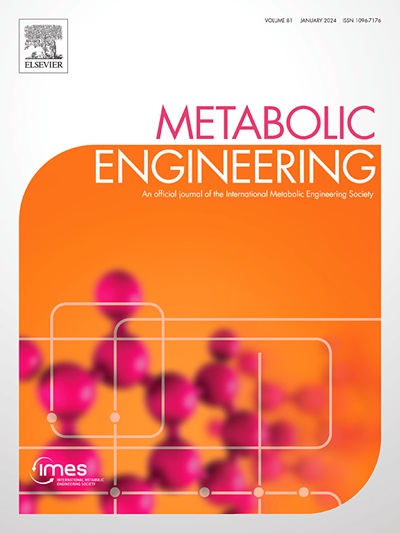对大肠杆菌和谷氨酸棒杆菌进行工程改造以高效生产 L-苏氨酸及其衍生物的最新进展
IF 6.8
1区 生物学
Q1 BIOTECHNOLOGY & APPLIED MICROBIOLOGY
引用次数: 0
摘要
l -苏氨酸是三大氨基酸之一,在食品、饲料、医药、化妆品等行业中发挥着至关重要的作用。目前,以发酵为基础的l -苏氨酸生产已经发展成为一种高效、经济、环保的工业过程。大肠杆菌和谷氨酸棒状杆菌作为氨基酸生产的工业主力,由于其完善的遗传背景和强大的分子工具,长期以来被广泛研究。本文综述了利用微生物代谢工程生产l -苏氨酸的研究进展。我们从l -苏氨酸合成模块、中心代谢模块和全局调控模块三个关键模块,全面分析了l -苏氨酸的整个代谢途径和生产过程的全局调控。系统总结了l -苏氨酸高价值衍生物的生物转化方法,拓宽了l -苏氨酸的应用范围和市场潜力。综上所述,本文综述了l -苏氨酸生物合成的多种有效策略,为l -天冬氨酸家族氨基酸及其衍生物的微生物生产提供了指导。本文章由计算机程序翻译,如有差异,请以英文原文为准。
Recent advances on engineering Escherichia coli and Corynebacterium glutamicum for efficient production of L-threonine and its derivatives
L-threonine, one of the three major amino acids, plays a vital role in various industries such as food, feed, pharmaceuticals, and cosmetics. Currently, the fermentation-based production of L-threonine has evolved into an efficient, cost-effective, and environmentally friendly industrial process. Escherichia coli and Corynebacterium glutamicum, as the industrial workhorses of amino acids production, have long been widely studied due to their well-established genetic backgrounds and powerful molecular tools. This review focuses on recent advances in the microbial production of L-threonine by metabolic engineering. From three key modules, including L-threonine synthesis module, central metabolism module and global regulation module, we provide a comprehensive analysis on the entire metabolic pathway of L-threonine and the global regulation of the production process. Furthermore, we systematically summarize biotransformation methods for producing high-value derivatives of L-threonine, thereby broadening the application scope and market potential of L-threonine. Overall, this review shows many effective strategies for the biosynthesis of L-threonine, and offers guidance for the microbial production of L-aspartate family amino acids and their derivatives.
求助全文
通过发布文献求助,成功后即可免费获取论文全文。
去求助
来源期刊

Metabolic engineering
工程技术-生物工程与应用微生物
CiteScore
15.60
自引率
6.00%
发文量
140
审稿时长
44 days
期刊介绍:
Metabolic Engineering (MBE) is a journal that focuses on publishing original research papers on the directed modulation of metabolic pathways for metabolite overproduction or the enhancement of cellular properties. It welcomes papers that describe the engineering of native pathways and the synthesis of heterologous pathways to convert microorganisms into microbial cell factories. The journal covers experimental, computational, and modeling approaches for understanding metabolic pathways and manipulating them through genetic, media, or environmental means. Effective exploration of metabolic pathways necessitates the use of molecular biology and biochemistry methods, as well as engineering techniques for modeling and data analysis. MBE serves as a platform for interdisciplinary research in fields such as biochemistry, molecular biology, applied microbiology, cellular physiology, cellular nutrition in health and disease, and biochemical engineering. The journal publishes various types of papers, including original research papers and review papers. It is indexed and abstracted in databases such as Scopus, Embase, EMBiology, Current Contents - Life Sciences and Clinical Medicine, Science Citation Index, PubMed/Medline, CAS and Biotechnology Citation Index.
 求助内容:
求助内容: 应助结果提醒方式:
应助结果提醒方式:


